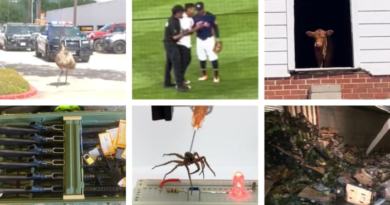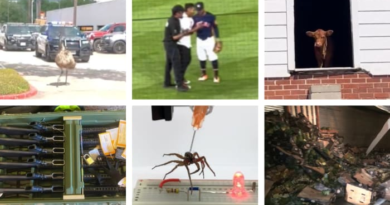The untold history of UC San Diego's terrible, weird and glorious single season of football – The San Diego Union-Tribune
UC San Diego is known for nerdy pursuits such as combing the cosmos for quarks and quasars and creating driverless vehicles that deliver the mail.
It’s not known for fielding rough-and-tumble football teams. But the moment has come to acknowledge a fact that has largely been lost to history.
For the record:
9:31 p.m. Oct. 15, 2022An earlier version of this story said that George Winne, Jr. died in 1971. He died in 1970.
This story is for subscribers
We offer subscribers exclusive access to our best journalism.
Thank you for your support.
For one year — and one year only — UCSD had a football team.
The year was 1968, and the team brought a bit of school spirit to a new campus that was reeling from the social upheaval caused by the Vietnam War, the civil rights movement and free speech campaigns.
The team lost all seven of its games, including one in which it fumbled the ball in the opposing team’s end zone. But the program had heart. And UCSD nearly beat equally nerdy Caltech in a nail-biter that left some players in tears.
All of this is captured in “Undefeated Since 1968,” a funny, poignant and slyly-named new documentary that tells the team’s story in the context of a politically charged period that came to be known as the year that shattered America.
Praveen Nair, who was sports editor of the campus newspaper The Guardian last year, produced the 71-minute program on his laptop, filling it with sharp social commentary, odd but relevant trivia, and gently snarky asides.
Nair, who is now a 21-year-old graduate student majoring in computer science, had never heard of the football team until last spring, when a friend sent him a two-paragraph citation about the players on Wikipedia. And he had never created a long-form video.
But he was soon scrolling through digital copies of one of UCSD’s earliest and most revered newspapers, the Triton Times, which roared to life in 1967, when campus activism was kicking into gear in then-conservative La Jolla.
“I realized that the football team was the least important thing that happened in 1968 as I clicked through the news pages to get to sports,” said Nair, who narrates the no-budget documentary in a wry, breezy voice. “It was a singular moment not only in campus history, but in the history of the country.”
The Free Speech Movement that arose at UC Berkeley was especially active at UCSD. So was opposition to the war. The critics included famed philosophy professor Herbert Mercuse, a radical Marxist whose words enraged many people.
This played out during a year punctuated by horrifying events.
In April 1968, civil rights leader Martin Luther King Jr. was assassinated in Memphis, Tenn. Two months later, Sen. Robert F. Kennedy was assassinated in Los Angeles. Then, in August, violent protests erupted outside the Democratic National Convention in Chicago.
Nair realized he couldn’t ignore this. His solution was to use newspaper clippings, photos, historic videos and music to weave together the story of the team and the campus unrest.
The material ranged from video of then-California Gov. Ronald Reagan insulting anti-war protestors on a visit to UCSD to a story in the Triton Times that talked about whether cheerleaders would wear suede miniskirts. He was unable to find any photos of the entire team, or clear images of the team at play.
As for the documentary’s title — “Undefeated Since 1968” — Nair used it because it’s catchy and, he said, “because it’s technically true that UCSD hasn’t lost a game since 1968.” He didn’t expect that the documentary would be seen beyond UCSD. But it got noticed and is now gaining viewers on YouTube.
UCSD was chiefly founded by oceanographer Roger Revelle, who wanted the campus to rapidly evolve into one of the nation’s foremost science and engineering schools. He detested the idea of big-time sports being part of the mix. As Nair notes with joy, Revelle went so far as to say that if UCSD ever started a football team, he hoped that it would lose every game it played.
To get the campus off to a fast start, Revelle helped recruit such legendary figures as Harold Urey, a Nobel laureate who helped develop the atom bomb, and physicist Herbert York, who also worked on the bomb.
UCSD’s first students weren’t left to wonder about the school’s goals.
“I went there in the 1960s and remember when we were called out on to Revelle Plaza by the provost,” said Tom Baker of Pacific Beach, who helped edit the Times.
“We were told, ‘Look at the person to your right, to your left, in front of you, and behind you. By the end of the first quarter, about 25 percent of them will be gone (because they couldn’t do the work).’
“We went to a dance that night,” he added, “and I remember people being very nervous.”
Well, maybe not everyone.
In late 1967, students began circulating a petition that called for the school to create a football team. Before long, they had gathered more than 1,000 signatures, and to everyone’s surprise UCSD granted their wish.
By early 1968, they had a coach, Walt Hackett, who was well-known locally. He grew up in Ramona and was defensive line coach for the San Diego Chargers from 1962 to 1966.
Hackett was a no-nonsense guy who stressed that education came first and that no practice would last more than two hours. But he did have his 31 players train at one of the most intimidating spots imaginable: Marine Corps Recruit Depot in San Diego.
A promising vibe had developed by the time the team teed-up the ball for its opening game against La Verne College in late September. Joy came quickly; UCSD took a 6-0 lead. Then La Verne scored 41 unanswered points, and it was over.
Elsewhere on campus, the vibe was far different. Eldridge Cleaver, minister of information for the Black Panthers, showed up in the school’s gym and led students in a profane chant against Reagan due to his remarks on free speech and academic rights. Cleaver’s fame was soaring with the release of his memoir, “Soul on Ice.”
UCSD lost its next three games. But there was a glimmer of hope as the team prepared to play Caltech in Pasadena on Nov. 9.
Caltech was on a 33-game losing streak, making it the butt of endless jokes.
“As far as I can tell, none of the players in this game have ever won a football game,” Nair says in the documentary. “But today, one of them is about to. They have to, right?”
For a while, even that seemed in doubt. It was a slugfest, with the teams trading scores. Some wondered if the contest would end in a tie. It didn’t. Caltech slammed home the winning points. A triumphant headline followed in the school newspaper: “CALTECH BEAVERS BEAT UCSD 34-31.”
“I was really embarrassed by that,” Baker said. “They were even nerdier than we were and had lost all those games. But they beat us.”
UCSD lost its final two games. Few noticed. Attention was further shifting to the political wars, and things grew tense in late November when Reagan showed up in La Jolla for a UC Board of Regents meeting being held on campus. He was met by hundreds of students standing in silent protest to Reagan’s push to shift certain academic powers from the faculty to the Regents.
“It would be fine if they really understood what was going on,” Reagan told a TV reporter as he sized up the protestors, “but they don’t.
The nation’s political problems worsened, and the following year UCSD quietly dropped football, a move largely ignored by students.
“Football became a footnote in history,” said Nair.
So did a lot of the anti-war and free speech demonstrations that occurred at UCSD in the ‘60s and ‘70s, including a moment of true horror in 1970, when student George Winne Jr. set himself on fire to protest the Vietnam War and died.
That’s not OK with Nair.
“As a university we don’t know our history…,” he says in the documentary. “Ultimately, this place seems to just be zooming into the future so fast it takes little to no care in being custodian to its past.
“If students arrive on this campus and learn nothing about its history, can they ever really learn to call it home?”
He gets a thumbs up on that point from Renney Senn of Eagle Crest, Ore., who founded and edited the Triton Times.
“How do you know what you are today if you don’t know where you’ve been?” Renn asked.
Get Essential San Diego, weekday mornings
Get top headlines from the Union-Tribune in your inbox weekday mornings, including top news, local, sports, business, entertainment and opinion.
You may occasionally receive promotional content from the San Diego Union-Tribune.
Follow Us
Science
Education
If approved by union members, the agreement will resolve what had been the nation’s largest-ever strike of academic workers, affecting the entire 10-campus University of California system.
Education
Xiang-Dong Fu says he was forced to resign after UCSD investigated his ties to Chinese researchers, part of a controversial initiative that some say unfairly scrutinized Chinese professors at American universities.
Energy
UC San Diego receives $10 million and Smartville Inc. of Carlsbad gets $6 million in grants from the U.S. Department of Energy
Education
The school district plans to change all staff and student passwords for school-related accounts, read a statement from the district’s superintendent Thursday.
California
UC postdoctoral scholars and academic researchers reach a tentative deal but won’t return to jobs, showing support to those workers still on strike.
Education
An appeals court agreed that only the state can create vaccine requirements for school attendance, not school districts
For the record:
9:31 p.m. Oct. 15, 2022: An earlier version of this story said that George Winne, Jr. died in 1971. He died in 1970.
Public Safety
Privacy Policy
Terms of Service
Sign Up For Our Newsletters
Follow Us




